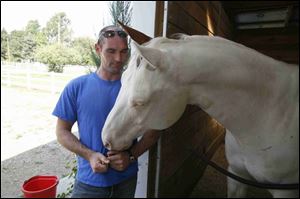
Horse rescuer puts heart, soul in work
9/27/2006
Craig Lundgren mission is to end horse slaughter and promote a more humane way to put down the creatures.
BOWLING GREEN - Horse rescuer Craig Lundgren is living his passion saving horses from slaughter, caring for them, and finding suitable homes for them.
"I put my heart, my soul, my money into these horses," Mr. Lundgren said while worming a horse on his six-acre farm. "I can remember at the age of 3 seeing horses on the TV screen and I was awestruck."
Mr. Lundgren, who grew up on a cattle farm in northern Minnesota, said he begged his father for a horse for years. On his 12th birthday, the wish came true.
"It was the happiest day of my life," the 36-year-old said.
Today his love for horses is often bittersweet when he heads to an auction knowing he can't save every horse. Some will end up going to slaughterhouses where they are killed and the meat is likely to be sold overseas for human consumption. American horse meat is sold mostly for people to eat in Europe and Asia; some goes to U.S. zoos.
"Most people are under the notion it goes for dog food or to feed the poor, but it's not - it goes for $25 a pound in some foreign countries," Mr. Lund-
gren said, to be sold in butcher shops and restaurants.
There are three slaughterhouses in the United States - two in Texas and one in Illinois - where horses are slaughtered and their meat is sent overseas.
Last month the U.S. House passed the Horse Slaughter Prevention Act, shedding light on Mr. Lundgren's mission to end horse slaughter and promote a more humane way to put down these creatures.
Last year, 88,271 horses were slaughtered in the United States, according to statistics provided by the United States Department of Agriculture.
"It's perfectly legal in this country to eat horse meat; however it is not something that is done much, if at all," said Steven Cohen, spokesman for the USDA's food and safety inspection service.
"Generally it's assumed it goes to foreign countries. It is for export. Our job is to make sure the animals for slaughter are healthy and the meat that comes from those animals is safe and healthy."
While many people in this country are under the misconception that horses sent for slaughter are old, debilitated, and sickly, Mr. Lundgren and the USDA confirm that healthy horses are the ones being sold at auctions to "kill-buyers," who are traders that act as middlemen for slaughterhouses.
"Fat, healthy, untrained horses up for auction - many will end up in slaughterhouses," Mr. Lundgren says.
It bothered him so much that he left his job as a postal carrier in Seattle and moved to Bowling Green four years ago to live his dream.
He said much of his passion for horses comes from his Native American roots. His mother is Native American, and they believe, Mr. Lundgren said, that horses are spiritual beings.
A part-time bartender at the Uptown-Downtown sports bar on North Main Street, Mr. Lundgren spreads the word about his mission and puts all his bartending tips into providing for the horses at Hobbie Horse Stables and Sanctuary.
"I have great support from the community," he said.
Typically he spends between $100 and $500 per horse at auctions like the ones in Shipshewana, Ind., and Sherpardsville, Ky. He's paid more than that, on occasion. He's saved 25 horses so far and adopted out 21.
His greatest supporters are brothers Jon and Jeff Hobbie, owners of Uptown-Downtown. "They love horses just as much as I do," Mr. Lundgren said. With their financial help, community support, and tips, Mr. Lundgren provides food, shelter, and veterinary care for the horses and pays a staff of seven.
"He dedicates his life to saving horses," said Brittany Joseph, who hopes to one day own one of Mr. Lundgren's rescued horses.
Mr. Lundgren is quite discerning when it comes to adoption. Potential owners must be interviewed and sign a contract stating if for any reason they are unable or choose not to keep the horse, Mr. Lundgren has first dibs on buying back the horse.
In January, horse lover Lauren Costello of Liberty Township, near Hamilton, Ohio, adopted one of Mr. Lundgren's horses - a black and white pony rescued from a pregnant mare urine farm in Canada.
The urine from pregnant mares is used in hormone replacement therapy for menopausal women. The foals are by-products that often end up on the auction block.
"She's a beautiful black and white paint," she said. "I've always wanted a horse. She has just become - I just can't even describe it she just really filled a void for me."
Ms. Costello is impressed by the work Mr. Lundgren is doing, especially because she once rescued dogs.
"He's a godsend; really, it takes so much to do that sort of work. I know it is heartbreaking," she said.